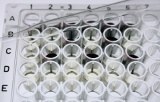
Radioimmunoassay (RIA)
Radioimmunoassay (RIA) is based on the principle of all immunoassays which is the recognition of an antigen present in a sample by antibodies directed against this antigen. The principle of radioimmunoassays is very similar to that of competitive ELISA and allows quantification of small molecules, peptides and proteins in biological samples.
Radioimmunoassay technique (RIA) is a very sensitive in vitro technique used to measure the concentration of antigens (eg, hormone levels in the blood) through the use of antibodies directed against these antigens. In a radioimmunoassay, a known amount of antigen is labeled with a radioactive element and mixed with a known amount of antibody directed against that antigen. When the sample containing the antigen of interest is added, the non-radioactive antigens are substituted for the radioactive antigens. After removal of the non-fixed antigens by washing, it is possible to measure the ratio between the radioactivity present in the supernatant and that of the standards. It is thus possible to determine the amount of antigen present in the sample.


